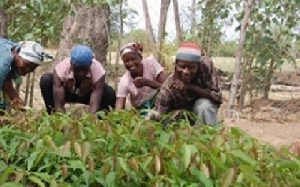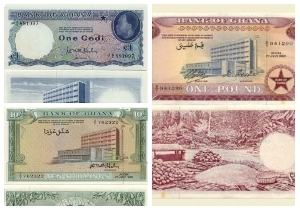To ensure food and nutrition security and resilience to the effects of climate change, a one-day intensive training on sustainable in-situ and on-farm conservation of neglected and underutilized root and tuber crops under the concept of the Community Seed Banking (CSB) project was held for selected farmers in the Akuapem North District of the Eastern Region.
The aim of the training was to teach the farmers how to conserve underutilized root and tuber crops on their farms so that these crop species would not be lost, thereby sustaining their provision of food and nutritional needs to society.
The training workshop was organized by NUS Network Ghana under a pilot project supported by the Agricultural Counselor Department of the Netherlands Embassy in collaboration with Bioversity and CIAT.
Participating farmers, numbering thirty-five (35), were drawn from Adawso, Mangoase, and Tinkong in the district.
They were taken through sustainable production and conservation of key root and tuber crops, including cassava, plantains, yam, sweet potato, taro, cocoyam, and tiger nuts. Participants were also informed about the challenges of on-farm conservation of crop varieties and measures to overcome them.
In a media engagement, Dr. Daniel Nyadanu, Coordinator of NUS Network Ghana, said on-farm conservation is the sustainable management of genetic diversity of locally developed traditional crop varieties, along with associated wild forms by farmers within traditional agricultural, horticultural, or agri-silvicultural cultivation systems, which is also known as in-situ conservation.
He indicated that if farmers can undertake on-farm conservation of their crop species, it would create a diversity of crops in the ecology of the Akuapem North District, and this would help promote food security.
Through this process, he said, the erosion of these genetic resources from our agricultural landscapes would be avoided to a greater extent.
According to him, with this practice, farmers use their own adopted methods to keep varieties of crops that they have selected in their local environments.
"The process helps to maintain the diversity within a particular locality, thereby helping stabilize the food system for our general good. By sustainably conserving these underutilized root and tuber crops in such environments, it means that farmers in the district can supply Koforidua Township and Accra City with necessary food resources,” he said.
Dr. Nyadanu emphasized the importance of the on-farm conservation and management of root and tuber crops to food security since they cannot be conserved in a seed bank or structure.
Hence the need to conserve them on-farm in their natural environment in a local area under a Community Seed Banking procedure.
This intervention, he said, was timely in view of the prevailing trend of climate change scenarios and their negative consequences for agricultural productivity.
Dr. Nyadanu disclosed that the program would be upscaled to other districts and regions in Ghana in due course to help achieve a broader objective of national food and nutrition security.
On his part, Dr. Richard Adu Amoah, a resource person and a member of NUS Network Ghana, said sweet potato is a versatile and important crop for food security since its storage root has high dietary fiber, minerals, vitamins, and antioxidant compounds.
He said on-farm conservation of sweet potatoes has been recognized as a strategy to ensure greater accessibility to the genetic diversity of traditional crop varieties, lower their conservation costs, reduce their vulnerability to losses, and allow their sustainable management.
Another member of NUS Network Ghana, Mr. Prince Pobee, said a number of indigenous plant species have been lost due to a lack of conservation, underutilization, and mismanagement.
He emphasized that the workshop educated farmers on how to conserve these important crop resources on their farms.
Mr. Pobee said that although the establishment of a community seed bank was commendable, it was necessary to undertake activities that would help farmers know the modalities for conserving varieties of their crops, especially root and tuber crops, on-farm, adding that the workshop duly served the purpose.
A farmer, Emmanuel Martey, the District Best Farmer for Akuapem North, commended the organizers for the workshop, saying that it has bridged their knowledge gap towards sustainable conservation of crop varieties on-farm for higher productivity and profitability.
Regional News of Wednesday, 3 July 2024
Source: Francis Cofie, Contributor

















